Sustainable Education Systems: Challenges and Solutions for UN SDGs
VerifiedAdded on 2023/06/09
|8
|1977
|352
Report
AI Summary
This report explores the challenges in implementing sustainable education systems to achieve the UN Sustainable Development Goals (SDGs). It identifies problems such as higher education institutions not providing the necessary skills and knowledge for promoting sustainable development and the difficulties in integrating sustainable practices into learning and teaching activities. The report discusses potential solutions, including ensuring inclusive and equal quality education and boosting lifelong learning opportunities for all. It emphasizes the importance of integrating sustainable development into all aspects of education, fostering positive behavior and thinking among students, and creating university partnerships to enhance sustainable practices. The individual reflective log provides insights into understanding the UN SDGs and identifying challenges in enhancing sustainable development practices in higher education. The report concludes by highlighting the importance of sustainable development and the role of educational institutions in achieving a sustainable future.
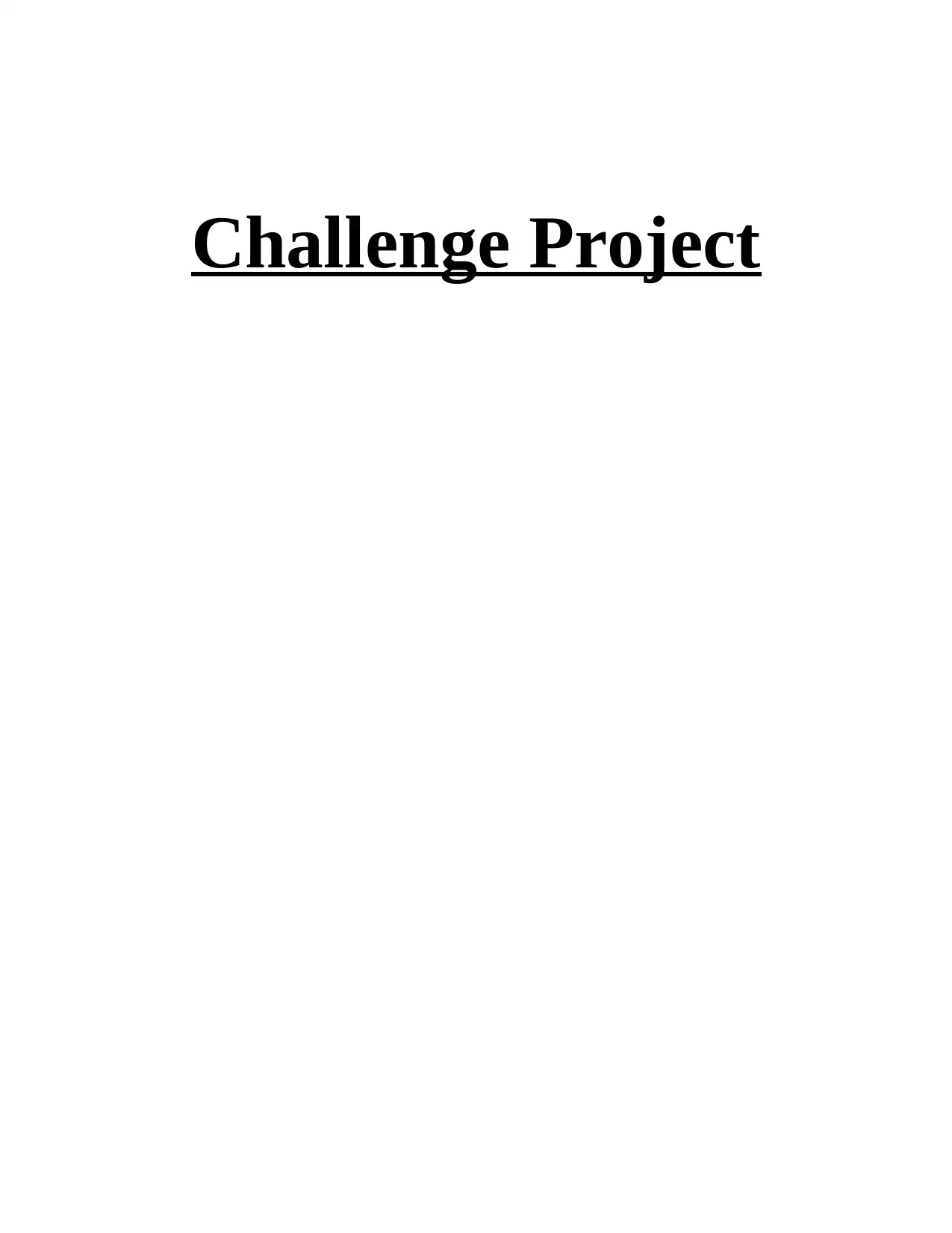
Challenge Project
Paraphrase This Document
Need a fresh take? Get an instant paraphrase of this document with our AI Paraphraser
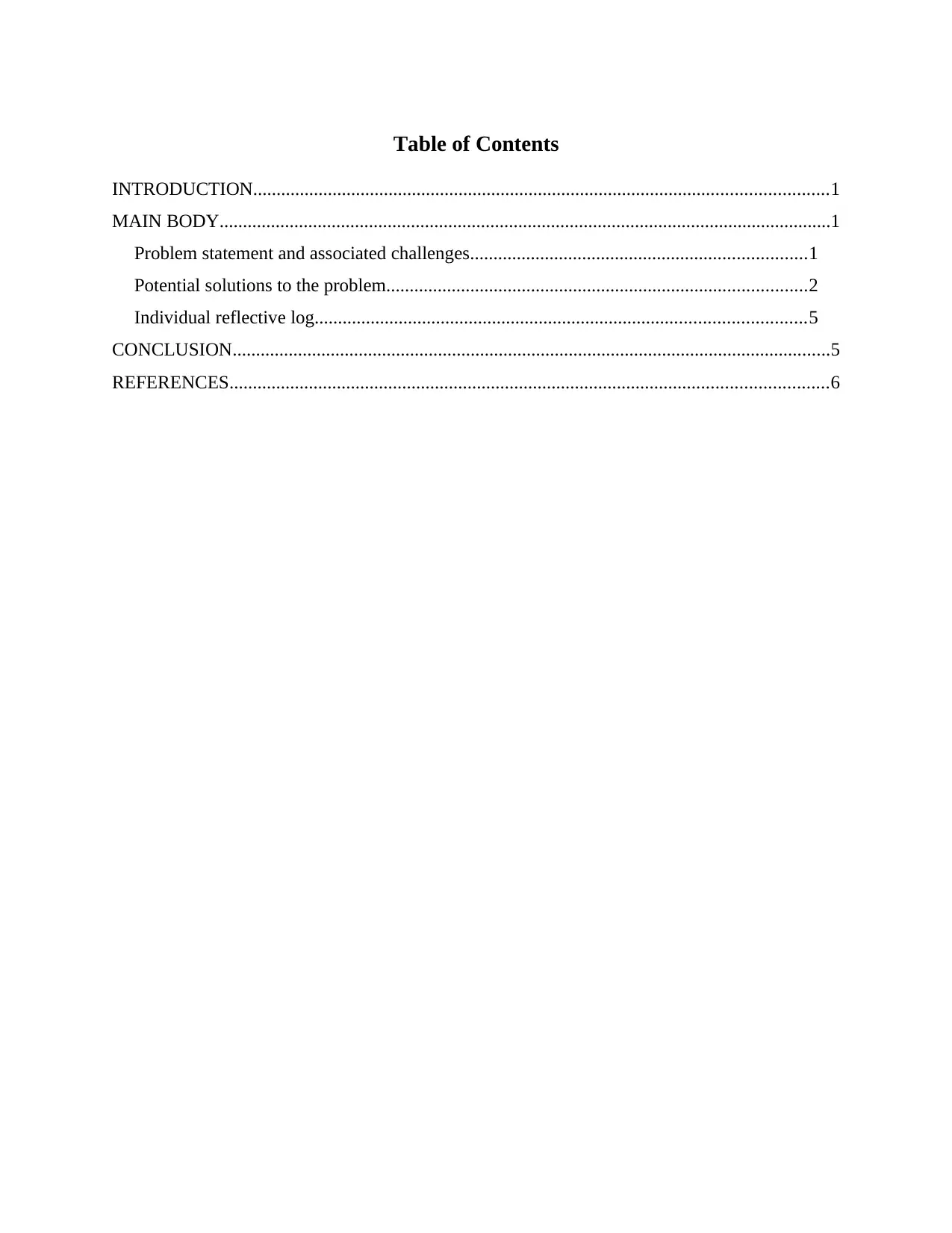
Table of Contents
INTRODUCTION...........................................................................................................................1
MAIN BODY...................................................................................................................................1
Problem statement and associated challenges........................................................................1
Potential solutions to the problem..........................................................................................2
Individual reflective log.........................................................................................................5
CONCLUSION................................................................................................................................5
REFERENCES................................................................................................................................6
INTRODUCTION...........................................................................................................................1
MAIN BODY...................................................................................................................................1
Problem statement and associated challenges........................................................................1
Potential solutions to the problem..........................................................................................2
Individual reflective log.........................................................................................................5
CONCLUSION................................................................................................................................5
REFERENCES................................................................................................................................6
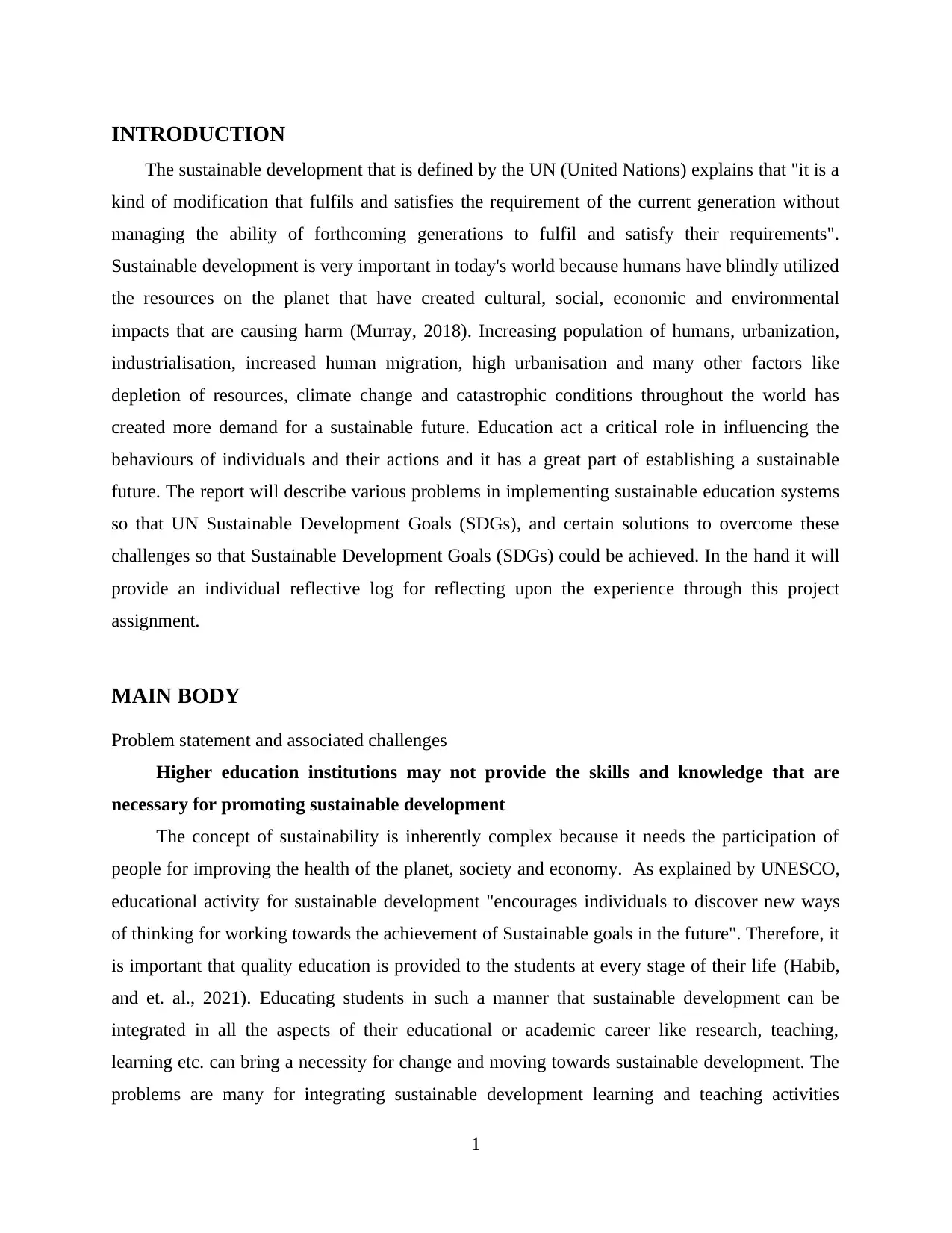
INTRODUCTION
The sustainable development that is defined by the UN (United Nations) explains that "it is a
kind of modification that fulfils and satisfies the requirement of the current generation without
managing the ability of forthcoming generations to fulfil and satisfy their requirements".
Sustainable development is very important in today's world because humans have blindly utilized
the resources on the planet that have created cultural, social, economic and environmental
impacts that are causing harm (Murray, 2018). Increasing population of humans, urbanization,
industrialisation, increased human migration, high urbanisation and many other factors like
depletion of resources, climate change and catastrophic conditions throughout the world has
created more demand for a sustainable future. Education act a critical role in influencing the
behaviours of individuals and their actions and it has a great part of establishing a sustainable
future. The report will describe various problems in implementing sustainable education systems
so that UN Sustainable Development Goals (SDGs), and certain solutions to overcome these
challenges so that Sustainable Development Goals (SDGs) could be achieved. In the hand it will
provide an individual reflective log for reflecting upon the experience through this project
assignment.
MAIN BODY
Problem statement and associated challenges
Higher education institutions may not provide the skills and knowledge that are
necessary for promoting sustainable development
The concept of sustainability is inherently complex because it needs the participation of
people for improving the health of the planet, society and economy. As explained by UNESCO,
educational activity for sustainable development "encourages individuals to discover new ways
of thinking for working towards the achievement of Sustainable goals in the future". Therefore, it
is important that quality education is provided to the students at every stage of their life (Habib,
and et. al., 2021). Educating students in such a manner that sustainable development can be
integrated in all the aspects of their educational or academic career like research, teaching,
learning etc. can bring a necessity for change and moving towards sustainable development. The
problems are many for integrating sustainable development learning and teaching activities
1
The sustainable development that is defined by the UN (United Nations) explains that "it is a
kind of modification that fulfils and satisfies the requirement of the current generation without
managing the ability of forthcoming generations to fulfil and satisfy their requirements".
Sustainable development is very important in today's world because humans have blindly utilized
the resources on the planet that have created cultural, social, economic and environmental
impacts that are causing harm (Murray, 2018). Increasing population of humans, urbanization,
industrialisation, increased human migration, high urbanisation and many other factors like
depletion of resources, climate change and catastrophic conditions throughout the world has
created more demand for a sustainable future. Education act a critical role in influencing the
behaviours of individuals and their actions and it has a great part of establishing a sustainable
future. The report will describe various problems in implementing sustainable education systems
so that UN Sustainable Development Goals (SDGs), and certain solutions to overcome these
challenges so that Sustainable Development Goals (SDGs) could be achieved. In the hand it will
provide an individual reflective log for reflecting upon the experience through this project
assignment.
MAIN BODY
Problem statement and associated challenges
Higher education institutions may not provide the skills and knowledge that are
necessary for promoting sustainable development
The concept of sustainability is inherently complex because it needs the participation of
people for improving the health of the planet, society and economy. As explained by UNESCO,
educational activity for sustainable development "encourages individuals to discover new ways
of thinking for working towards the achievement of Sustainable goals in the future". Therefore, it
is important that quality education is provided to the students at every stage of their life (Habib,
and et. al., 2021). Educating students in such a manner that sustainable development can be
integrated in all the aspects of their educational or academic career like research, teaching,
learning etc. can bring a necessity for change and moving towards sustainable development. The
problems are many for integrating sustainable development learning and teaching activities
1
⊘ This is a preview!⊘
Do you want full access?
Subscribe today to unlock all pages.

Trusted by 1+ million students worldwide
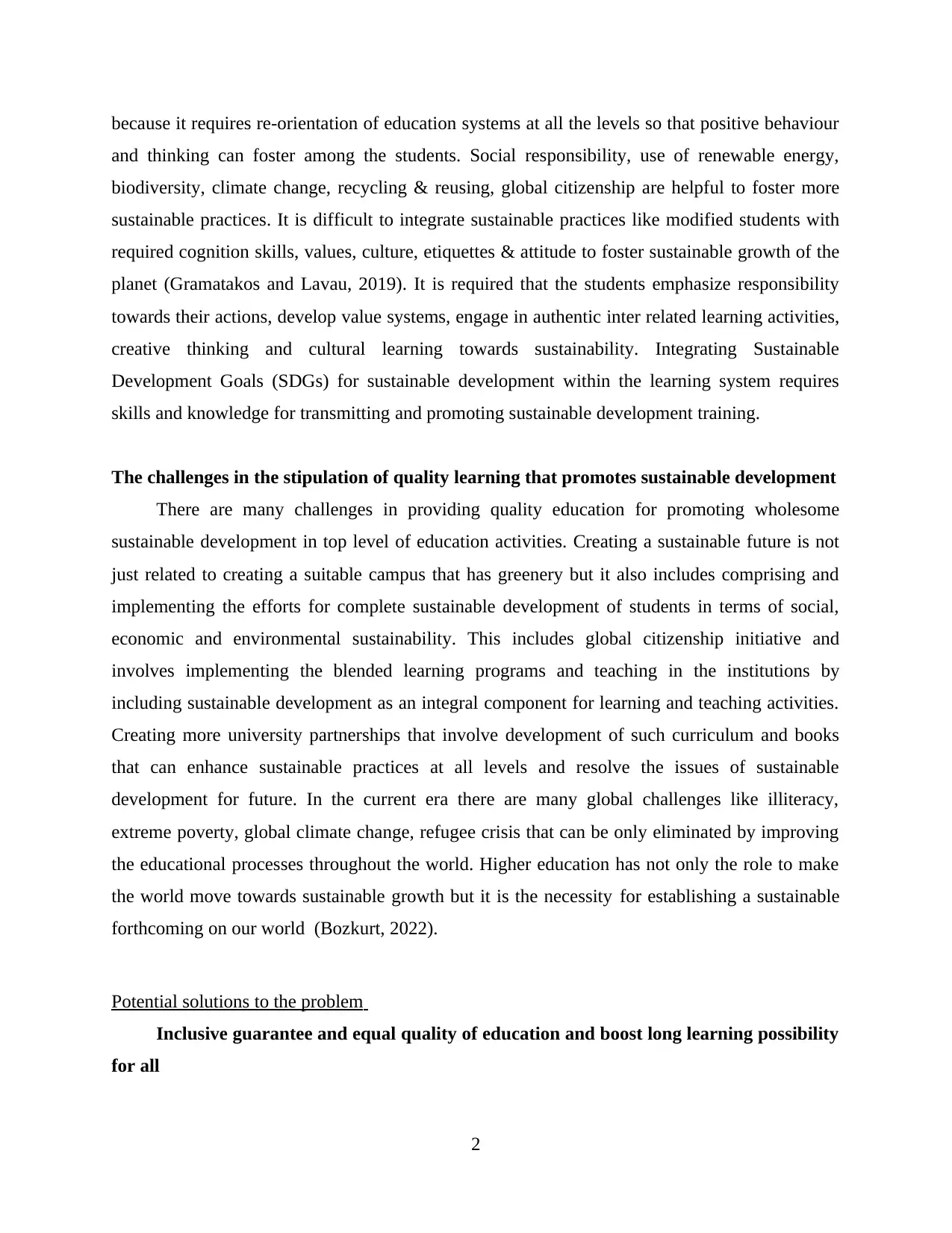
because it requires re-orientation of education systems at all the levels so that positive behaviour
and thinking can foster among the students. Social responsibility, use of renewable energy,
biodiversity, climate change, recycling & reusing, global citizenship are helpful to foster more
sustainable practices. It is difficult to integrate sustainable practices like modified students with
required cognition skills, values, culture, etiquettes & attitude to foster sustainable growth of the
planet (Gramatakos and Lavau, 2019). It is required that the students emphasize responsibility
towards their actions, develop value systems, engage in authentic inter related learning activities,
creative thinking and cultural learning towards sustainability. Integrating Sustainable
Development Goals (SDGs) for sustainable development within the learning system requires
skills and knowledge for transmitting and promoting sustainable development training.
The challenges in the stipulation of quality learning that promotes sustainable development
There are many challenges in providing quality education for promoting wholesome
sustainable development in top level of education activities. Creating a sustainable future is not
just related to creating a suitable campus that has greenery but it also includes comprising and
implementing the efforts for complete sustainable development of students in terms of social,
economic and environmental sustainability. This includes global citizenship initiative and
involves implementing the blended learning programs and teaching in the institutions by
including sustainable development as an integral component for learning and teaching activities.
Creating more university partnerships that involve development of such curriculum and books
that can enhance sustainable practices at all levels and resolve the issues of sustainable
development for future. In the current era there are many global challenges like illiteracy,
extreme poverty, global climate change, refugee crisis that can be only eliminated by improving
the educational processes throughout the world. Higher education has not only the role to make
the world move towards sustainable growth but it is the necessity for establishing a sustainable
forthcoming on our world (Bozkurt, 2022).
Potential solutions to the problem
Inclusive guarantee and equal quality of education and boost long learning possibility
for all
2
and thinking can foster among the students. Social responsibility, use of renewable energy,
biodiversity, climate change, recycling & reusing, global citizenship are helpful to foster more
sustainable practices. It is difficult to integrate sustainable practices like modified students with
required cognition skills, values, culture, etiquettes & attitude to foster sustainable growth of the
planet (Gramatakos and Lavau, 2019). It is required that the students emphasize responsibility
towards their actions, develop value systems, engage in authentic inter related learning activities,
creative thinking and cultural learning towards sustainability. Integrating Sustainable
Development Goals (SDGs) for sustainable development within the learning system requires
skills and knowledge for transmitting and promoting sustainable development training.
The challenges in the stipulation of quality learning that promotes sustainable development
There are many challenges in providing quality education for promoting wholesome
sustainable development in top level of education activities. Creating a sustainable future is not
just related to creating a suitable campus that has greenery but it also includes comprising and
implementing the efforts for complete sustainable development of students in terms of social,
economic and environmental sustainability. This includes global citizenship initiative and
involves implementing the blended learning programs and teaching in the institutions by
including sustainable development as an integral component for learning and teaching activities.
Creating more university partnerships that involve development of such curriculum and books
that can enhance sustainable practices at all levels and resolve the issues of sustainable
development for future. In the current era there are many global challenges like illiteracy,
extreme poverty, global climate change, refugee crisis that can be only eliminated by improving
the educational processes throughout the world. Higher education has not only the role to make
the world move towards sustainable growth but it is the necessity for establishing a sustainable
forthcoming on our world (Bozkurt, 2022).
Potential solutions to the problem
Inclusive guarantee and equal quality of education and boost long learning possibility
for all
2
Paraphrase This Document
Need a fresh take? Get an instant paraphrase of this document with our AI Paraphraser
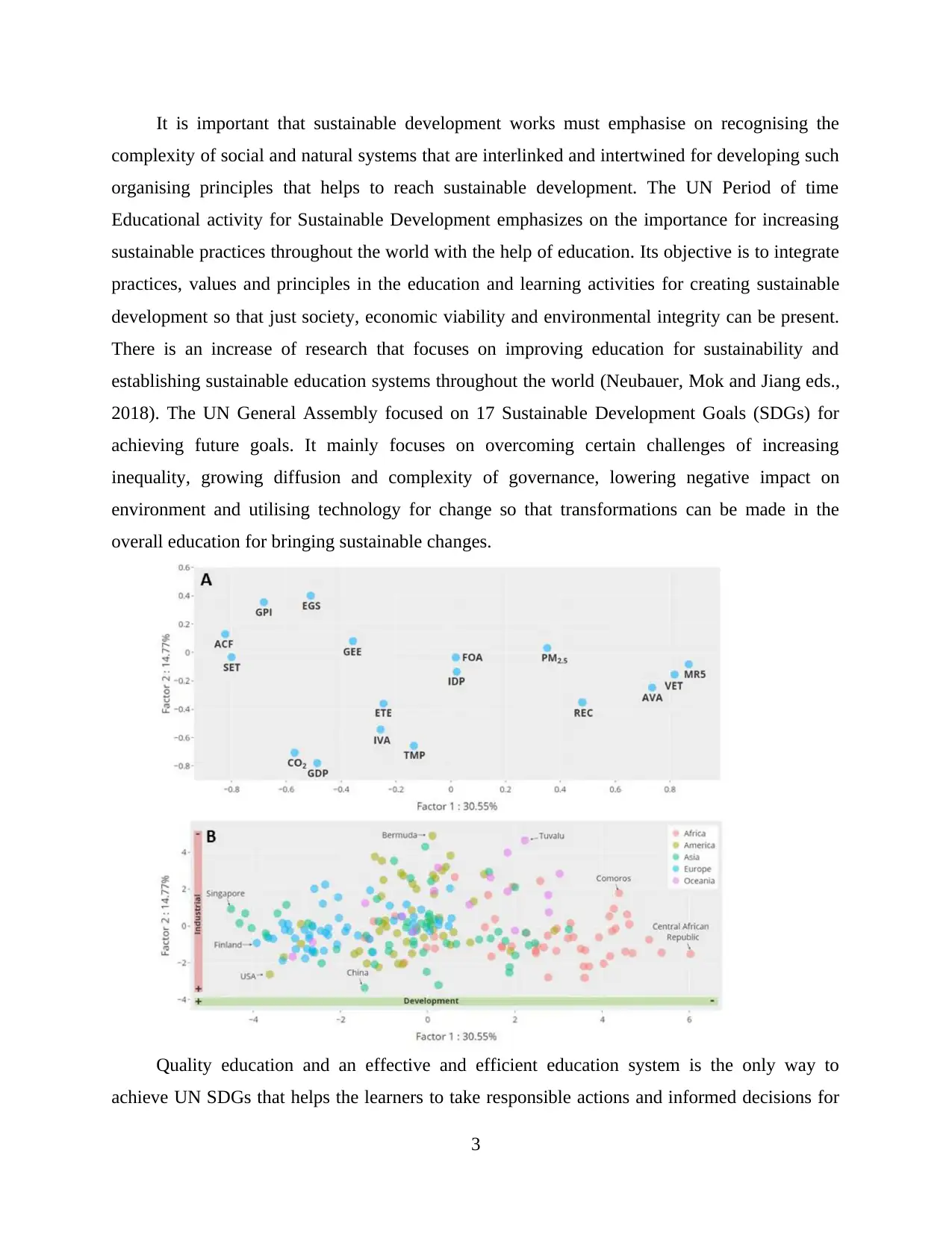
It is important that sustainable development works must emphasise on recognising the
complexity of social and natural systems that are interlinked and intertwined for developing such
organising principles that helps to reach sustainable development. The UN Period of time
Educational activity for Sustainable Development emphasizes on the importance for increasing
sustainable practices throughout the world with the help of education. Its objective is to integrate
practices, values and principles in the education and learning activities for creating sustainable
development so that just society, economic viability and environmental integrity can be present.
There is an increase of research that focuses on improving education for sustainability and
establishing sustainable education systems throughout the world (Neubauer, Mok and Jiang eds.,
2018). The UN General Assembly focused on 17 Sustainable Development Goals (SDGs) for
achieving future goals. It mainly focuses on overcoming certain challenges of increasing
inequality, growing diffusion and complexity of governance, lowering negative impact on
environment and utilising technology for change so that transformations can be made in the
overall education for bringing sustainable changes.
Quality education and an effective and efficient education system is the only way to
achieve UN SDGs that helps the learners to take responsible actions and informed decisions for
3
complexity of social and natural systems that are interlinked and intertwined for developing such
organising principles that helps to reach sustainable development. The UN Period of time
Educational activity for Sustainable Development emphasizes on the importance for increasing
sustainable practices throughout the world with the help of education. Its objective is to integrate
practices, values and principles in the education and learning activities for creating sustainable
development so that just society, economic viability and environmental integrity can be present.
There is an increase of research that focuses on improving education for sustainability and
establishing sustainable education systems throughout the world (Neubauer, Mok and Jiang eds.,
2018). The UN General Assembly focused on 17 Sustainable Development Goals (SDGs) for
achieving future goals. It mainly focuses on overcoming certain challenges of increasing
inequality, growing diffusion and complexity of governance, lowering negative impact on
environment and utilising technology for change so that transformations can be made in the
overall education for bringing sustainable changes.
Quality education and an effective and efficient education system is the only way to
achieve UN SDGs that helps the learners to take responsible actions and informed decisions for
3
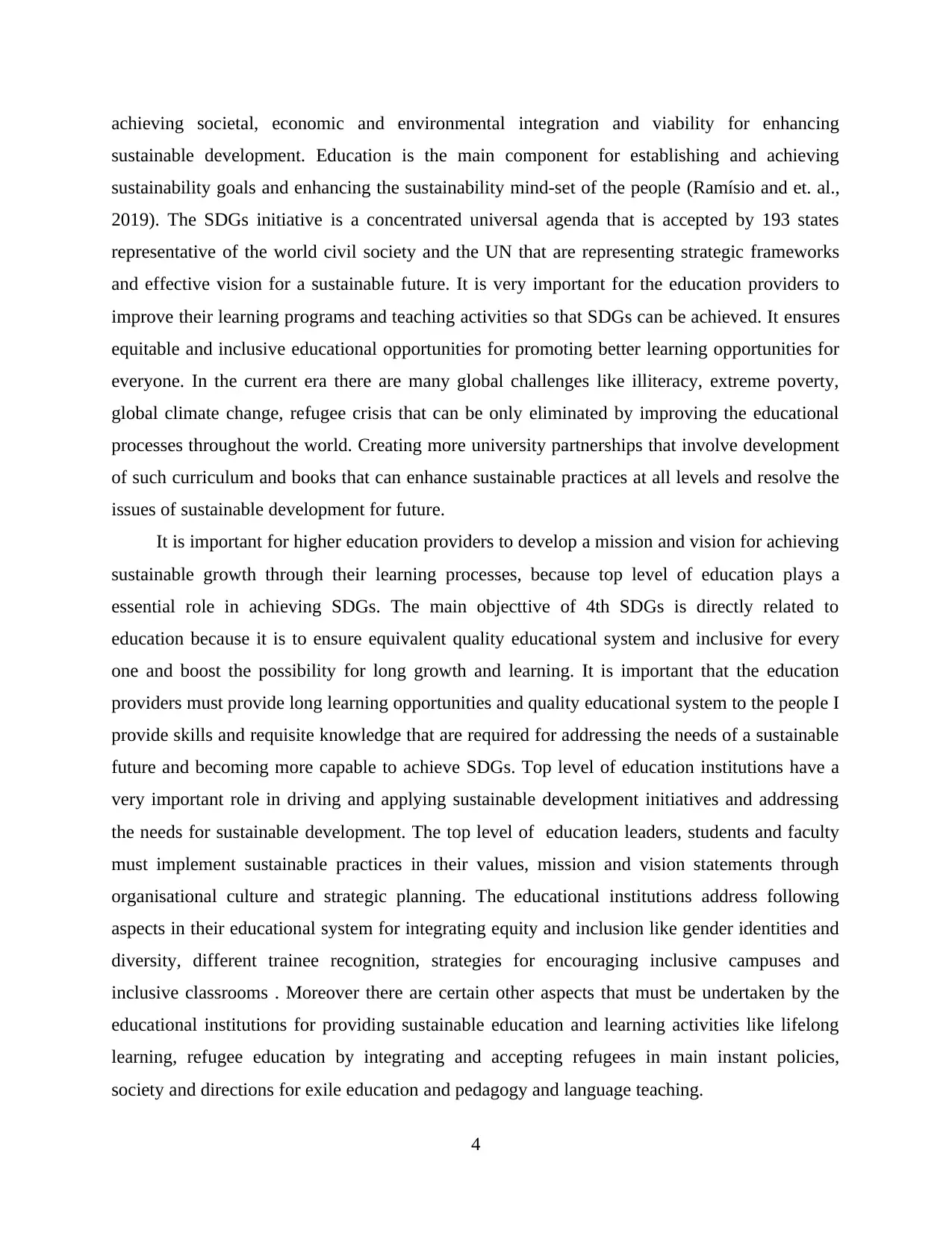
achieving societal, economic and environmental integration and viability for enhancing
sustainable development. Education is the main component for establishing and achieving
sustainability goals and enhancing the sustainability mind-set of the people (Ramísio and et. al.,
2019). The SDGs initiative is a concentrated universal agenda that is accepted by 193 states
representative of the world civil society and the UN that are representing strategic frameworks
and effective vision for a sustainable future. It is very important for the education providers to
improve their learning programs and teaching activities so that SDGs can be achieved. It ensures
equitable and inclusive educational opportunities for promoting better learning opportunities for
everyone. In the current era there are many global challenges like illiteracy, extreme poverty,
global climate change, refugee crisis that can be only eliminated by improving the educational
processes throughout the world. Creating more university partnerships that involve development
of such curriculum and books that can enhance sustainable practices at all levels and resolve the
issues of sustainable development for future.
It is important for higher education providers to develop a mission and vision for achieving
sustainable growth through their learning processes, because top level of education plays a
essential role in achieving SDGs. The main objecttive of 4th SDGs is directly related to
education because it is to ensure equivalent quality educational system and inclusive for every
one and boost the possibility for long growth and learning. It is important that the education
providers must provide long learning opportunities and quality educational system to the people I
provide skills and requisite knowledge that are required for addressing the needs of a sustainable
future and becoming more capable to achieve SDGs. Top level of education institutions have a
very important role in driving and applying sustainable development initiatives and addressing
the needs for sustainable development. The top level of education leaders, students and faculty
must implement sustainable practices in their values, mission and vision statements through
organisational culture and strategic planning. The educational institutions address following
aspects in their educational system for integrating equity and inclusion like gender identities and
diversity, different trainee recognition, strategies for encouraging inclusive campuses and
inclusive classrooms . Moreover there are certain other aspects that must be undertaken by the
educational institutions for providing sustainable education and learning activities like lifelong
learning, refugee education by integrating and accepting refugees in main instant policies,
society and directions for exile education and pedagogy and language teaching.
4
sustainable development. Education is the main component for establishing and achieving
sustainability goals and enhancing the sustainability mind-set of the people (Ramísio and et. al.,
2019). The SDGs initiative is a concentrated universal agenda that is accepted by 193 states
representative of the world civil society and the UN that are representing strategic frameworks
and effective vision for a sustainable future. It is very important for the education providers to
improve their learning programs and teaching activities so that SDGs can be achieved. It ensures
equitable and inclusive educational opportunities for promoting better learning opportunities for
everyone. In the current era there are many global challenges like illiteracy, extreme poverty,
global climate change, refugee crisis that can be only eliminated by improving the educational
processes throughout the world. Creating more university partnerships that involve development
of such curriculum and books that can enhance sustainable practices at all levels and resolve the
issues of sustainable development for future.
It is important for higher education providers to develop a mission and vision for achieving
sustainable growth through their learning processes, because top level of education plays a
essential role in achieving SDGs. The main objecttive of 4th SDGs is directly related to
education because it is to ensure equivalent quality educational system and inclusive for every
one and boost the possibility for long growth and learning. It is important that the education
providers must provide long learning opportunities and quality educational system to the people I
provide skills and requisite knowledge that are required for addressing the needs of a sustainable
future and becoming more capable to achieve SDGs. Top level of education institutions have a
very important role in driving and applying sustainable development initiatives and addressing
the needs for sustainable development. The top level of education leaders, students and faculty
must implement sustainable practices in their values, mission and vision statements through
organisational culture and strategic planning. The educational institutions address following
aspects in their educational system for integrating equity and inclusion like gender identities and
diversity, different trainee recognition, strategies for encouraging inclusive campuses and
inclusive classrooms . Moreover there are certain other aspects that must be undertaken by the
educational institutions for providing sustainable education and learning activities like lifelong
learning, refugee education by integrating and accepting refugees in main instant policies,
society and directions for exile education and pedagogy and language teaching.
4
⊘ This is a preview!⊘
Do you want full access?
Subscribe today to unlock all pages.

Trusted by 1+ million students worldwide
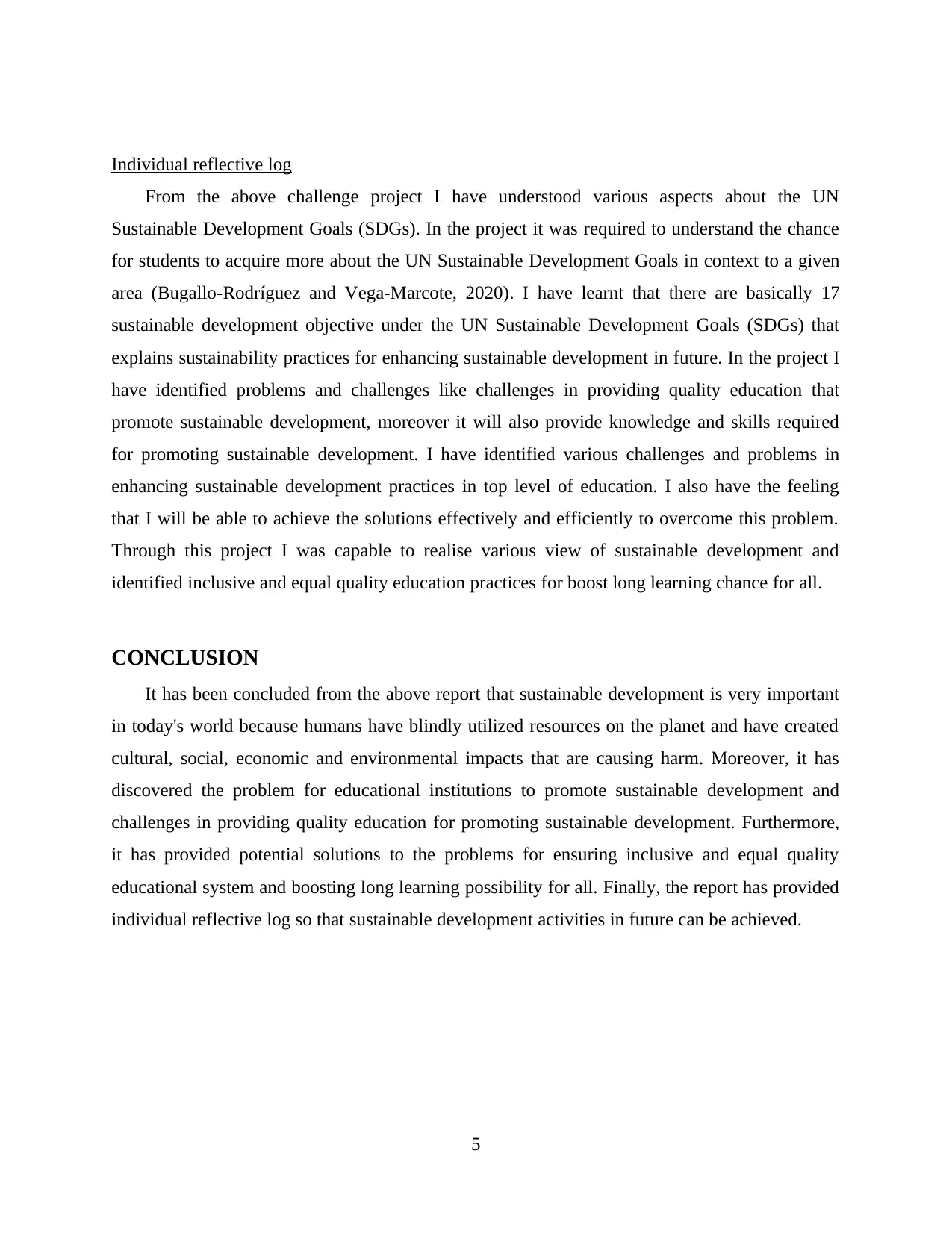
Individual reflective log
From the above challenge project I have understood various aspects about the UN
Sustainable Development Goals (SDGs). In the project it was required to understand the chance
for students to acquire more about the UN Sustainable Development Goals in context to a given
area (Bugallo-Rodríguez and Vega-Marcote, 2020). I have learnt that there are basically 17
sustainable development objective under the UN Sustainable Development Goals (SDGs) that
explains sustainability practices for enhancing sustainable development in future. In the project I
have identified problems and challenges like challenges in providing quality education that
promote sustainable development, moreover it will also provide knowledge and skills required
for promoting sustainable development. I have identified various challenges and problems in
enhancing sustainable development practices in top level of education. I also have the feeling
that I will be able to achieve the solutions effectively and efficiently to overcome this problem.
Through this project I was capable to realise various view of sustainable development and
identified inclusive and equal quality education practices for boost long learning chance for all.
CONCLUSION
It has been concluded from the above report that sustainable development is very important
in today's world because humans have blindly utilized resources on the planet and have created
cultural, social, economic and environmental impacts that are causing harm. Moreover, it has
discovered the problem for educational institutions to promote sustainable development and
challenges in providing quality education for promoting sustainable development. Furthermore,
it has provided potential solutions to the problems for ensuring inclusive and equal quality
educational system and boosting long learning possibility for all. Finally, the report has provided
individual reflective log so that sustainable development activities in future can be achieved.
5
From the above challenge project I have understood various aspects about the UN
Sustainable Development Goals (SDGs). In the project it was required to understand the chance
for students to acquire more about the UN Sustainable Development Goals in context to a given
area (Bugallo-Rodríguez and Vega-Marcote, 2020). I have learnt that there are basically 17
sustainable development objective under the UN Sustainable Development Goals (SDGs) that
explains sustainability practices for enhancing sustainable development in future. In the project I
have identified problems and challenges like challenges in providing quality education that
promote sustainable development, moreover it will also provide knowledge and skills required
for promoting sustainable development. I have identified various challenges and problems in
enhancing sustainable development practices in top level of education. I also have the feeling
that I will be able to achieve the solutions effectively and efficiently to overcome this problem.
Through this project I was capable to realise various view of sustainable development and
identified inclusive and equal quality education practices for boost long learning chance for all.
CONCLUSION
It has been concluded from the above report that sustainable development is very important
in today's world because humans have blindly utilized resources on the planet and have created
cultural, social, economic and environmental impacts that are causing harm. Moreover, it has
discovered the problem for educational institutions to promote sustainable development and
challenges in providing quality education for promoting sustainable development. Furthermore,
it has provided potential solutions to the problems for ensuring inclusive and equal quality
educational system and boosting long learning possibility for all. Finally, the report has provided
individual reflective log so that sustainable development activities in future can be achieved.
5
Paraphrase This Document
Need a fresh take? Get an instant paraphrase of this document with our AI Paraphraser
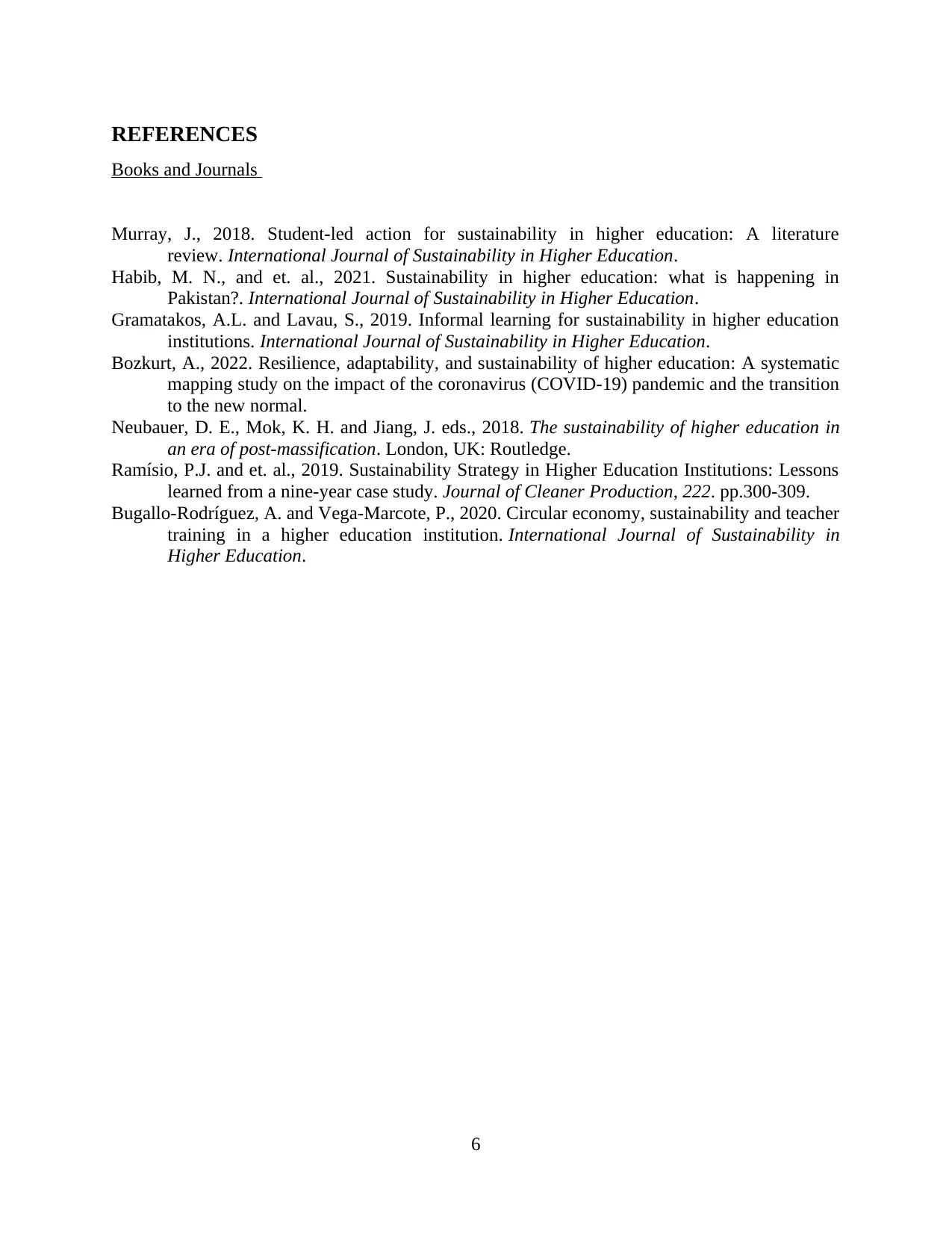
REFERENCES
Books and Journals
Murray, J., 2018. Student-led action for sustainability in higher education: A literature
review. International Journal of Sustainability in Higher Education.
Habib, M. N., and et. al., 2021. Sustainability in higher education: what is happening in
Pakistan?. International Journal of Sustainability in Higher Education.
Gramatakos, A.L. and Lavau, S., 2019. Informal learning for sustainability in higher education
institutions. International Journal of Sustainability in Higher Education.
Bozkurt, A., 2022. Resilience, adaptability, and sustainability of higher education: A systematic
mapping study on the impact of the coronavirus (COVID-19) pandemic and the transition
to the new normal.
Neubauer, D. E., Mok, K. H. and Jiang, J. eds., 2018. The sustainability of higher education in
an era of post-massification. London, UK: Routledge.
Ramísio, P.J. and et. al., 2019. Sustainability Strategy in Higher Education Institutions: Lessons
learned from a nine-year case study. Journal of Cleaner Production, 222. pp.300-309.
Bugallo-Rodríguez, A. and Vega-Marcote, P., 2020. Circular economy, sustainability and teacher
training in a higher education institution. International Journal of Sustainability in
Higher Education.
6
Books and Journals
Murray, J., 2018. Student-led action for sustainability in higher education: A literature
review. International Journal of Sustainability in Higher Education.
Habib, M. N., and et. al., 2021. Sustainability in higher education: what is happening in
Pakistan?. International Journal of Sustainability in Higher Education.
Gramatakos, A.L. and Lavau, S., 2019. Informal learning for sustainability in higher education
institutions. International Journal of Sustainability in Higher Education.
Bozkurt, A., 2022. Resilience, adaptability, and sustainability of higher education: A systematic
mapping study on the impact of the coronavirus (COVID-19) pandemic and the transition
to the new normal.
Neubauer, D. E., Mok, K. H. and Jiang, J. eds., 2018. The sustainability of higher education in
an era of post-massification. London, UK: Routledge.
Ramísio, P.J. and et. al., 2019. Sustainability Strategy in Higher Education Institutions: Lessons
learned from a nine-year case study. Journal of Cleaner Production, 222. pp.300-309.
Bugallo-Rodríguez, A. and Vega-Marcote, P., 2020. Circular economy, sustainability and teacher
training in a higher education institution. International Journal of Sustainability in
Higher Education.
6
1 out of 8
Related Documents
Your All-in-One AI-Powered Toolkit for Academic Success.
+13062052269
info@desklib.com
Available 24*7 on WhatsApp / Email
![[object Object]](/_next/static/media/star-bottom.7253800d.svg)
Unlock your academic potential
Copyright © 2020–2026 A2Z Services. All Rights Reserved. Developed and managed by ZUCOL.





